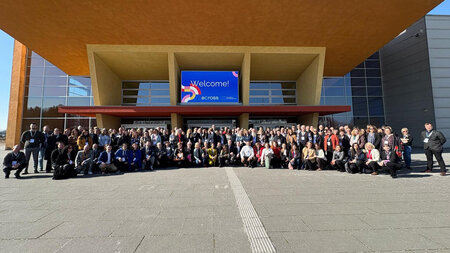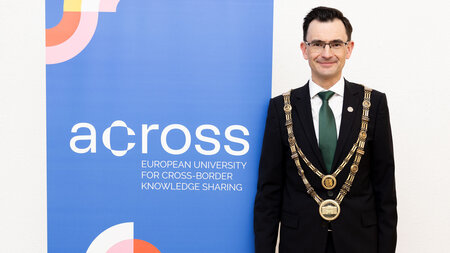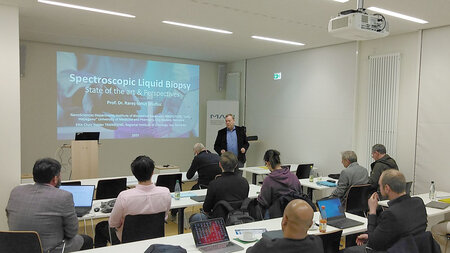Scientific Perspectives on Forced Migration Worldwide
Fourth conference of the German Network For Forced Migration Research offers an extensive program at Chemnitz University of Technology from September 28 to 30, 2022 - 400 conference guests from all over the world will participate in the hybrid event
-

The international conference of the German Network for Forced Migration Studies will forced migration processes worldwide and recent challenges in the research field. Graphic: Chemnitz University of Technology
From September 28 to 30, 2022, forced migration scholars from Germany and more than 30 other countries will meet at Chemnitz University of Technology to discuss the state of scientific research on this topic. Prof. Dr. Birgit Glorius from the host professorship of Human Geography with a focus on European Migration Studies at Chemnitz University of Technology explains the complexity and topicality of the subject: "Sadly, the number of refugees and displaced persons worldwide has reached an all-time high this year, with more than 89 million. The war in Ukraine has brought the topic closer to the German public again. The Network for Forced Migration Studies enables a continuous view on flight and refugee reception and provides scientific expertise for mastering this political and social challenge."
Refugees are confronted by a multitude of dangers and challenges, which they meet with different coping strategies. Refugees, as an individual person just as a category, challenges fundamental principles of statehood, law, political communities and society. But also host states and communities are challenged by the reception of refugees. They need to develop governance schemes for refugee reception processes, but also for long-term settlement and social inclusion, and they need to consider the wider social context and public opinion.
The fourth conference of the German Network for Forced Migration Studies at Chemnitz University of Technology offers the opportunity to discuss these questions on the basis of the latest studies and research findings from both German and international research on forced migration and refugees. Glorius is pleased that the conference will take place in Chemnitz: "This conference is also an opportunity to highlight the importance of the topic in connection with social cohesion. In Chemnitz in particular, but also in eastern Germany as a whole, there are many civil society activists who are promoting democracy and anti-racism in the context of (forced) migration. These issues are important to us, and they will therefore be appropriately represented at the conference."
Further focal points are spatial aspects of forced migration and refugee studies as well as the discussion of developments in the German research field in comparison to international forced migration studies. The conference also addresses the Ukraine war and reflects on refugee movements in the context of the Russian invasion. A keynote address by two renowned migration researchers from Germany (Dr. Franck Düvell, Osnabrück University) and Ukraine (Dr. Viktoria Sereda, Ukrainian Catholic University) will – taking the example of refugee movements from Ukraine - reflect on the multidimensionality of refugee movements, which is usually underestimated in public perception and thus also leads to erroneous political conclusions. "The public mainly focuses on refugees fleeing the country, while the fate of internally displaced persons is neglected," Düvell said: "In fact, there have already been over 1.5 million internally displaced people in Ukraine since 2014. Many of them are now displaced a second time." Secondly, there is a homogenizing view of the refugees in and from Ukraine, whereas in reality they represent a socially, politically, religiously or ethnically rather diverse group. The keynote speakers also point out the multidimensionality of refugee movements, while in the public perception, flight is usually perceived as unidirectional and unidimensional movement. Düvell: "Flight is usually depicted in cartography by thick one-way arrows from A to B. We will show that this perspective is wrong, because forced migration leads to much more complicated movements, such as step-wise displacement, but also return and transnational migration."
"This keynote, as well as the other keynotes and panels at the conference, will also engage in a critical debate about the spatial focus of our research perspective, which is often directed from the Global North to the Global South, while leaving out, for example, the specifics of the Global East," Glorius explains, adding: "Applying spatial but also postcolonial and intersectional research perspectives helps us to unfold the complexity of the topic and also make it more comprehensible for the interested public."
The conferences of the German Network for Forced Migration Studies, which was founded in 2013, are intended as a platform for discussions and networking among researchers in the field of refugee research. The Chemnitz Conference 2022 will be the fourth conference of the network, and the most international so far. For the first time, it will be held in a fully hybrid format, as Glorius explains: "Our preparations for this conference already started in 2021, when we were in the midst of the Corona pandemic. In view of these uncertainties, we decided to plan the conference as a face-to-face conference with online participation. So, similar to hybrid study courses, online participants have the opportunity to join conference sessions remotely and engage in discussions via video and audio transmission. Of the approximately 400 registered participants, about half will take advantage of this opportunity, including quite a few refugee activists from countries in the Global South.
Further information and link to the program: https://fluchtforschung.net/veranstaltungen/4-konferenz-des-netzwerks-fluchtforschung/
Contact: Prof. Dr. Birgit Glorius, tel. + 49 371 531-33435, e-mail birgit.glorius@phil.tu-chemnitz.de.
(Translation: Brent Benofsky)
Matthias Fejes
22.09.2022





